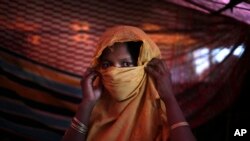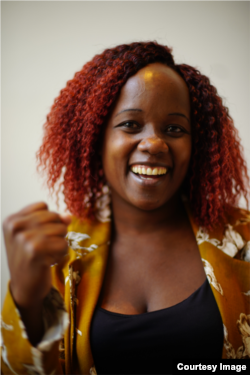Sexual violence is a devastating weapon of war accompanied by fear and misunderstanding. Perpetrators are often soldiers who act with impunity.
"Rapists have to be brought to justice, but how can we do this when the rapists are those in power," said Mildred, a survivor of conflict-related sexual violence from Zimbabwe.
Mildred is one of the women featured in a new initiative from the foundation of Nobel Peace Prize recipient Dr. Denis Mukwege designed to empower victims and educate the public about rape in conflict zones.
In support of the U.N. International Day for the Elimination of Sexual Violence in Conflict, the Mukwege Foundation has created SEMA, the Global Network of Victims and Survivors to End Wartime Sexual Violence.
SEMA means "speak out" in Swahili, and the network includes 50 survivors across 21 countries.
"We focus on breaking the silence," Malini Laxminarayan, program officer at SEMA, told VOA. "We focus on building a collective memory, and what we do at the foundation is really provide a platform for these women to come together to need to realize that they're not alone and become more empowered through this in order to fight for their own rights and demand their rights."
African countries are among the most affected by conflict-related sexual violence. In 2018, the United Nations reported 1,049 cases affecting 1,041 women and girls and eight men and boys in the Democratic Republic of the Congo; 238 incidents involving 1,291 victims in South Sudan; and 179 incidents affecting 259 victims in the Central African Republic.
Although these figures are alarming, experts agree the vast majority of incidents go unreported.
SEMA is working to break this silence. "What we've seen with the survivors is, the moment that they see that they're not alone, they're much more ready to speak out," Laxminarayan said.
"Because if you don't feel that it's your fault, but if you realize this is actually a systematic pattern that's occurring, survivors are then much less likely to either put the blame on themselves or to feel that they have something to be ashamed about."
The Mukwege Foundation provides a platform for survivors to share their stories. It also seeks to secure reparations for survivors and has a treatment model based on "holistic care" that includes psychological support and legal assistance.
Mukwege, a gynecologist, treats more than 3,500 women a year from Panzi Hospital in the DRC. His work to heal rape victims earned him the nickname "Dr. Miracle."
Rape causes not only physical harm and trauma; it often stigmatizes women within their communities. Some are shunned or made to feel at fault for what happened. SEMA believes that creating an international support network can help decrease that stigma.
"At the global level, women actually see it's happening in other countries, which they often don't realize," Laxminarayan said. "They also understand, 'OK, this is not something that is done specifically to me, but we have this opportunity now to speak about it with others who know exactly what we've gone through. And we can really rely on support with them because they're the ones who really understand.' "





